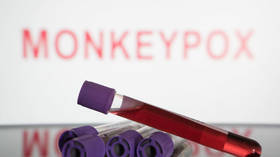Possible reason for speedy transmission of monkeypox revealed

The monkeypox virus mutates much faster than expected when transmitted among humans, new research suggests, providing a possible explanation for the rapid spread of the disease.
In a study published in Nature Medicine on Friday, Portuguese researchers reported the results of “rapid application of high-throughput shotgun metagenomics” as they began reconstructing the first genome sequences of the 2022 ‘version’ of the monkeypox virus.
They discovered that the 2022 virus differs from the related 2018-19 viruses by 50 SNP mutations, which are changes that occur in a single nucleotide in the genome. This is roughly six to 12 times more “than one would expect considering previous estimates of the substitution rate for orthopoxviruses (one or two substitutions per site per year).”
“Such a divergent branch might represent accelerated evolution,” the researchers claim. They noted, however, that further studies on the matter are needed.
“Considering that this 2022 monkeypox virus is likely a descendant of the one in the 2017 Nigeria outbreak, one would expect no more than five to 10 additional mutations instead of the observed about 50 mutations. We hope that now, specialized groups will perform laboratory experiments in order to understand if this 2022 virus has increased its transmissibility,” one of the study’s authors, head of the Genomics & Bioinformatics Unit at the National Institute of Health in Portugal, Joao Paulo Gomes, told Newsweek.
The news came as the World Health Organization considers whether the virus outbreak should be classed as a public health emergency of international concern.
According to the US Centers for Disease Control and Prevention, as of June 23, 3,504 cases of monkeypox have been registered in 44 countries with the biggest number reported in the United Kingdom (793 cases).
With the disease spreading predominantly among gay men, the СDС has cautioned doctors not to mistake it for more common sexually transmitted diseases.
The WHO is not currently recommending mass vaccination against monkeypox. However, on June 21, the UK Health Security Agency announced that “some gay and bisexual men at higher risk of exposure to monkeypox should be offered vaccines to help control the recent outbreak of the virus.”
The initial symptoms of monkeypox include fever, headache, muscle aches, backache, swollen lymph nodes, chills, and exhaustion. A rash often begins on the face and then spreads to other parts of the body, although the WHO has noted that patients affected by the current outbreak are developing lesions on the genitals and anus, and not developing some of the traditional flu-like symptoms of infection.
The virus can be spread by close contact with lesions, body fluids, respiratory droplets, as well as via contaminated materials.













